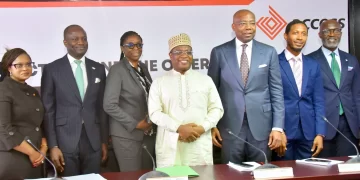The Governor of the Central Bank of Nigeria (CBN), Olayemi Cardoso, has unveiled plans to establish a Compliance Department by February 2025. This announcement was made during the launch of the 2025 Macroeconomic Outlook Report titled “Stabilisation in Transition: Rethinking Reform Strategies for 2025 and Beyond,” organised by the Nigerian Economic Summit Group (NESG) in Lagos.
Speaking virtually at the hybrid event, Cardoso explained that the department aims to address past challenges, align with global standards, and strengthen the financial sector’s transparency and resilience.
“The Central Bank of Nigeria is unwavering in its commitment to integrity, transparency, and accountability in the banking industry,” Cardoso stated. “The establishment of the Compliance Department represents a transformative step towards building a financial system that drives economic growth and development.”
The governor emphasised the department’s dual focus on internal and external operations, adding that it will be operational by the end of February.
Cardoso also highlighted the CBN’s focus on exchange rate stability to support business growth and fiscal policies in critical sectors. He underscored the importance of strengthening financial institutions to ensure effective support for the real sector, citing the establishment of the National Credit Guarantee Company as a measure to de-risk lending to key industries.
He identified inflation as a major threat to businesses and reiterated the bank’s efforts to keep it under control. While acknowledging the challenges posed by high-interest rates, Cardoso noted that inflation poses a greater risk to the economy.
“Our choices may be limited, but high-interest rates are expected to be short-lived. The real threat is inflation, which affects everyone. Effective communication and platforms like this event are essential to addressing these challenges,” he said.
Cardoso reaffirmed the CBN’s GDP growth projection of 4.17% for 2025, attributing it to ongoing reforms, stable oil prices, improved domestic oil production, and diaspora inflows. He called for stronger collaboration between monetary and fiscal authorities, alongside private sector participation, to sustain growth.
The governor expressed optimism about current reforms, citing increased investor interest in Nigeria, and assured stakeholders that the CBN would continue to tackle inflation and other economic challenges.
Creidt: NAN (Text Excluding Headline)






















